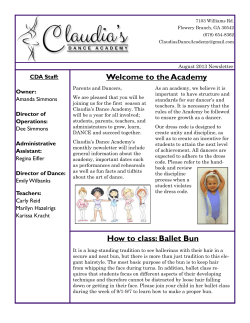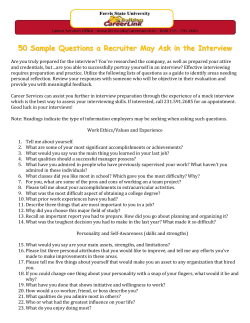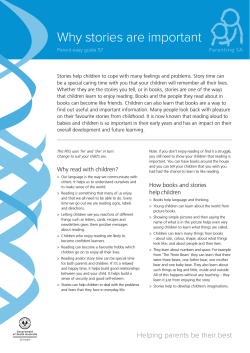
mandated to receive services. Agency
Sample Process Recording - First Year MSW Student Agency: Department of Social Services Client System: Claudia Jones, age 22, unemployed single mother Date: February 22, 20xx Presenting Issues: Client was referred to DSS for neglecting her 3-year-old daughter, Mia. Mother has custody of child but has been mandated to receive services. Purpose of Interview: Fourth interview; follow up interview for mandated client Content Skills Used Gut Reaction Student (S): How have things been going this week? Client (C): OK, I guess. Not much different than last week. S: Did you get a chance to check into parenting classes like we discussed last week? I’m happy to see Claudia again. C: No. This wasn’t a good week. I know I promised that I’d make phone calls but Mia got sick and I got so tired being up all night with her. Then I guess I forgot. She’s making excuses. S: Well, it does sound like this was a hard week for you. Do you think you can make the calls this week? Analysis Field Instructor’s Comments I’m following up on what we talked about last week. I want Claudia to know that what she does is important. Empathizing I’m showing empathy for the client’s situation, but I’m also asking her commitment to follow through this week. The “Gut Reaction” column is to record your own feelings, rather than your thoughts about the client’s motivations. How did you feel when Claudia said that she didn’t make the phone call because her daughter was ill? Good idea that empathizing with the client would be helpful here. Based on Claudia’s response (verbal and non-verbal), how do you think she heard what you 1 said? Are there other things you might say to convey your empathic concern about Claudia’s difficult week taking care of her sick daughter? C: I’ll try. Could you give me the phone numbers again? I think I lost them. S: Sure. [I write down the phone numbers and give them to Claudia.] Be sure and put them in a safe place. C: OK. I’ll really try to call this week. [She started looking around the office.] What else do we have to talk about today? S: This is your time, Claudia. What would you like to talk about? C: Like I said – not much has changed since last week. S: Well, Claudia, what do you think you learned from the No wonder she didn’t call! Providing resource information I’m getting the idea she doesn’t want to be here. Maybe there’s something else I should be doing but I don’t know what it is. Open-ended question I am trying to be collaborative and get Claudia engaged in the session. Good observations about yourself and Claudia. You’re picking up cues from Claudia’s words and behaviors and you’re aware of your own feelings of uncertainty. Your goal of trying to get Claudia engaged is excellent. How do you think your openended question worked here? If it didn’t move you towards your goal, think about what else you might try to get Claudia engaged. We can discuss your ideas in supervision. I feel stuck. Since she doesn’t have anything to say, I’ll try This does come across as trying to teach Claudia a lesson. 2 problems you had last week making the phone calls? Is there anything you could do differently this week? Remember we talked a couple weeks ago about changes that you could make that would make your life easier, like going to the parenting class. You might learn new ways to discipline Mia and help her play better with other kids. C: Last week was just hard for me because Mia was sick. I’ll really try to call this week. S: Remember – you have to take a parenting class before the next hearing on your case. C: I know. S: I’m a parent myself and I know how hard it can be to find time to do everything. But when your kids are to use the fact that she didn’t follow through as a learning experience. She has to learn to be responsible. Perhaps as her social worker, you feel responsible for her following through? Working with mandated clients can be complicated. Let’s talk about some ways you can distinguish between the client’s responsibilities and yours. This is the second time that Claudia has mentioned that Mia was ill. Because Claudia has been referred for neglect, it’s important to explore what Claudia did when her daughter was sick and to support efforts she made to care for Mia. Let’s talk about how you might do this. Providing information The court has mandated parenting classes for Claudia so I need to really get her to comply. Self disclosure (I think) I am using myself as an example to show that I can connect with Claudia as another Although self disclosure, used judiciously, can be a useful intervention, there are some helpful guidelines for when and 3 involved, you have to make the time. Right? C: I don’t know if I’m going to be able to come next week. My sister won’t be able to watch Mia for me and I don’t have any other babysitter. S: Let’s talk about why you are here. Why do you think you are here? C: [Silence] Why don’t you tell me. You seem to have all the answers. S: Maybe there is something else you want to talk about today. C: Not really. S: If you can’t come next Wednesday, we can reschedule for another day next week. parent. This is an excuse. how to self disclose. One guideline is that the purpose of the disclosure should always be to address the client’s needs. Another guideline is to observe how the client reacts to your self disclosure. Based on what Claudia says next, how do you think she might have experienced the way you told her you are also a parent? What were your feelings here? I’m re-focusing on the purpose of the interview. Sharing responsibility Open-ended question Uh-oh. I’m afraid she’s angry with me. I hope so. I don’t want her to leave feeling angry. I think she’s angry and I’m trying to be flexible, it makes me very but I’m not sure what uncomfortable. else to do. Good self awareness. How do you think your feelings about Claudia here, and at other points during the interview, might be 4 affecting how you’re interacting with her? I’m not sure if she means this. Maybe she’s trying to cooperate. This will give me time to talk to my field instructor about what to do next. C: You tell me what day and I’ll be here. S: OK. Then let’s keep our next meeting on Wednesday since that’s our usual day. Remember your goals. Don’t forget to call about the parenting class. This is a great case for us to discuss. Before our next supervision session, think about your own feelings during the interview (remember – you might feel all kinds of ways). Assess the helpfulness and effectiveness of your interventions. Which ones seemed to work well? Why? Student’s Assessment: I think I started out OK by following up on what Claudia was supposed to do before our meeting. I had a hard time with this interview because Claudia doesn’t seem to understand the importance of following through on the court’s recommendations and I want her to attend parenting classes so she can get learn to stop neglecting Mia. At the end of the interview, I didn’t want Claudia to leave feeling angry with me so I tried to change the subject. I don’t think this worked very well. I’d like to learn other things I could have said. Plan for Next Interview: Talk with my field instructor about what to do when a client doesn’t follow through and when she gets angry with me. _____ _____ _____ _____ _____ _____ _____ _____ _____ Teaching/Learning Points for Field Instructors about this Process Recording: This student demonstrates a strong desire and some beginning ability to stay engaged with a mandated, relatively uncommunicative client. S/he also demonstrates some beginning self awareness, although both engagement and self awareness are areas where growth is needed. In this process recording, the student’s lack of awareness of her/his feelings (of what appear to be frustration and annoyance 5 with the client) affect the student’s ability to stay non-judgmental and connected to the client’s experience. Focusing on every “mistake” or poor response could overwhelm this beginning student. Therefore the field instructor has chosen to focus primarily on two areas where growth is needed and which seem to reflect “where the student is” – (1) greater awareness of the student’s own feelings during the interview and how these feelings might affect her/his interactions with the client; and (2) paying attention to how the client responds to the student’s interventions and what the student can learn from these responses. Notice that the field instructor notes positives about the student when they occur (self awareness, good intentions even if they aren’t executed perfectly). The field instructor gives the student specific areas to think about before the next supervision session. The field instructor avoids coming down hard on this beginning student, especially by not being harsh and judgmental. Taking a critical attitude with the student would replicate in the supervision the times in the session where the student sounded judgmental toward the client. (This is known as parallel process and can flow both ways, i.e, processes that begin between student and supervisor can be re-enacted between student and client.) One way to help the client develop greater empathy for the client and begin to assess the helpfulness of interventions would be to conduct a role play in which the student plays Claudia and the field instructor plays the social worker. 6
© Copyright 2025














